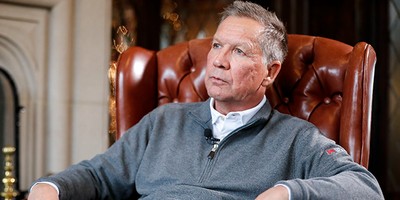Recessions are part of capitalism. They happen every so often. We've had two in the last super-prosperous 25 years. And it looks like we're entering a third one after Friday's jobs-loss report.
The unemployment rate went up to 5.1 percent, which is still a low number in historical terms. But the March labor report showed a loss of 80,000 payroll jobs, while payrolls in the prior two months were downwardly revised by 67,000. Non-farm payrolls have fallen for three straight months after peaking last December. Private-sector jobs have dropped four consecutive months.
This is a big warning sign. Within the private-sector report, professional and business services payrolls -- one of the biggest gainers over the past 15 years -- dropped 35,000, the third straight monthly decline following a December peak. Meanwhile, the household survey that picks up entrepreneurial small-business totals is now down 678,000 jobs since a peak in November.
The recessionary handwriting looks to be on the wall. Other recession indicators used by the National Bureau of Economic Research, such as disposable income and overall business and retail sales, are now several months below their peaks of last fall.
Lest we get too gloomy, there were some positive spots in the employment report. For example, the median duration of unemployment actually fell to a 15-month low of 8.1 weeks in March, the lowest level since December 2006. This indicates that about half of the unemployed are finding jobs in about two months. (Hat tip to professor Mark Perry of the Carpe Diem blogsite.) Additionally, aggregate hours worked in March actually rose, as did the private and manufacturing workweeks.
Recommended
So while there is an economic correction at work, it could prove relatively mild. Let's remember, the United States has experienced 10 recessions since 1947, averaging 10 months in length. But in the more recent high-tech quarter century, in which tax rates and inflation have been historically low, the two recessions of 1990-91 and 2000-01 lasted only eight months.
If the current slump began in November, it could be over by late summer.
And let's also remember that recessions are therapeutic. They're even necessary to create the foundations for the next recovery. Economic excesses always occur in free-market capitalist economies, and from time to time they must be cleansed. Just think about the excessive risk-speculation, leverage and housing prices of the current episode. If anything, recessions make for clean starts.
And think of this: Despite housing woes, credit problems and the sub-prime virus, banks are still lending to businesses. In other words, we don't have a genuine, across-the-board credit crunch. This is very good news, and more evidence that an economic contraction will not be drawn out.
That said, there are two related issues that worry me. First is the continued decline in the value of the dollar, which has permitted the global commodities boom (energy and food) to leak into higher U.S. inflation. Bulging commodity costs have depressed the profits of non-financial domestic businesses, where after-tax earnings are down 24 percent from a peak in late 2006.
Profits are the mother's milk of stocks, businesses and the economy. And because profits have fallen, some businesses are contracting and laying off workers in order to bring costs back in line with revenues.
If Washington really wants to help the business sector recover, nothing would be better than an across-the-board cut in corporate tax rates. This competitiveness-enhancing action would lower tax costs, boost jobs and lift worker wages. The growth incentive would reignite the economy. A permanent corporate tax cut would be far better than a temporary consumer rebate.
The other worrisome issue is inflation. The March jobs report showed a continued easing of hourly wage growth. After a 4.3 percent peak in late 2006, average hourly earnings for non-management workers has slowed to 3.6 percent for the 12 months ending in March. Consequently, headline consumer inflation of 4 percent continues to erode average wages. While most all market observers are focused on the sub-prime credit crisis, it's the pick-up of inflation in recent months that has dampened consumer-spending power and corporate profits.
As lawmakers in Congress contemplate a massive FHA housing bailout package, they would be better advised to look more carefully at the recession-ending benefits of lower business tax rates and a stronger greenback.
In fact, liberal economists should look at a new Rasmussen poll in which 48 percent of voters say the best thing government can do is get out of the way by reducing taxes and regulations. Only 36 percent disagree. What's more, 59 percent of voters believe it's more important to create economic growth than to reduce the income gap between rich and poor. Finally, 49 percent say the best government policy is to reduce spending.
Keynesian-style politicians please take notice.

























Join the conversation as a VIP Member